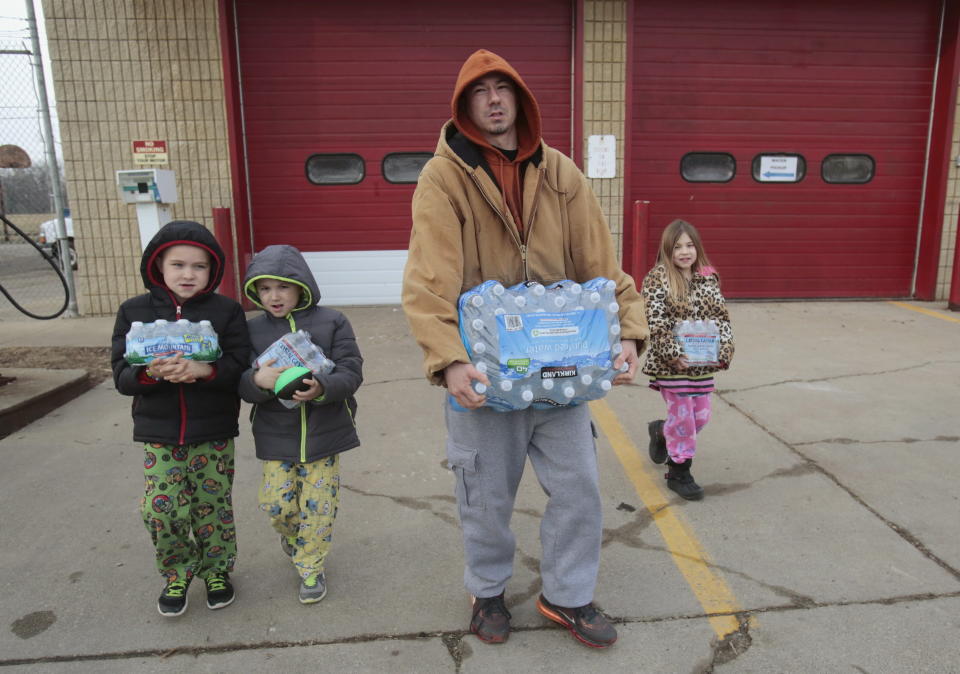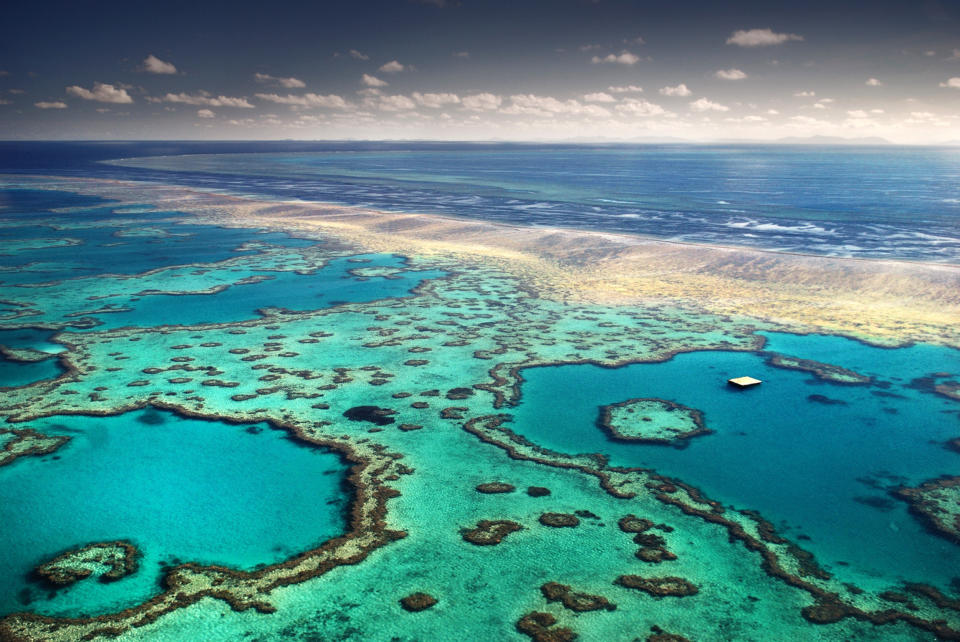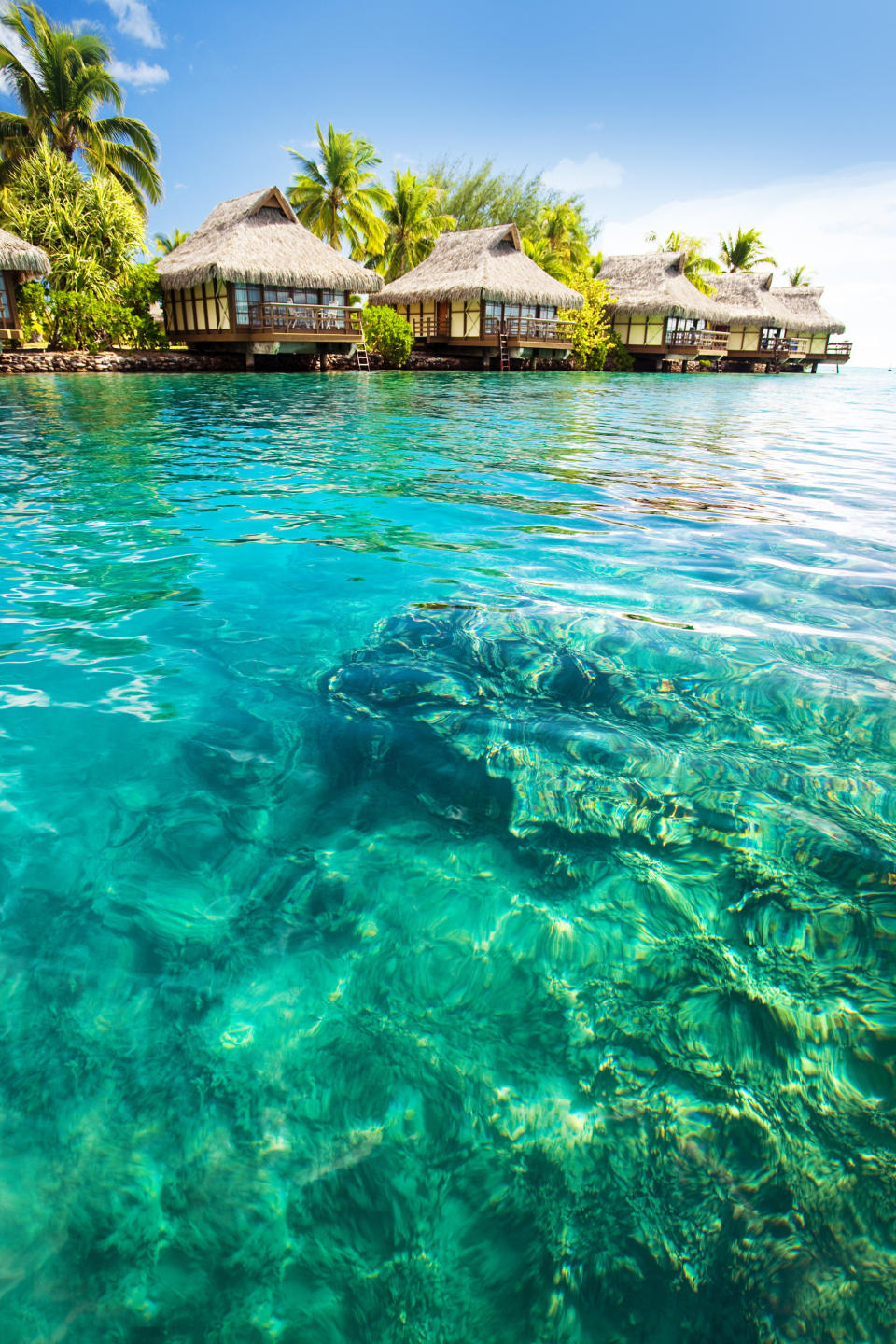Michigan Is Facing An ‘All-Out Assault On Water.’ Will It Swing The State In 2020?
EAST LANSING, Mich. ― “They’re called ‘forever chemicals,’” a narrator intones overdramatic music as a little girl sips from a glass of water. “And once these toxins enter your body, they can stay there for the rest of your life.”
This 30-second ad is running across the Republican-leaning 8th Congressional District in central Michigan, where GOP challengers are lining up to take on Rep. Elissa Slotkin (D-Mich.), a moderate freshman Democrat whose vote last year to impeach President Donald Trump angered voters.
Paid for by the League of Conservation Voters and a super PAC tied to House Speaker Nancy Pelosi, the ad does not directly tell voters to cast ballots for Slotkin this year. Instead, it highlights bills she’s introduced to curb contamination from the family of water-tainting substances known as PFAS or “forever chemicals,” which are linked to cancer and other diseases. The narrator urges voters in the district to “thank” Slotkin and “tell her to continue fighting to keep our water safe.”
This is likely just the first of many water-related ads to appear on the Great Lake State’s airwaves this year as the subject heats up. Whether it’s gurgling from underground pipes into faucets, bottled in plastic and sold in supermarkets or lapping on the second most expansive shoreline of any state in the union, this state’s water is in crisis.
Michigan has identified more sites contaminated by PFAS ― short for perfluoroalkyl and polyfluoroalkyl substances ― than any other state. An aging oil pipeline risks polluting vital fisheries and freshwater reserves. Poor residents either drink water poisoned by corroded lead pipes or face service shut-offs as a cash-strapped public agency looks to sell itself to a private company. Corporate giants pay “practically nothing” to tap state water supplies, bottle it in nature-destroying packaging and sell it at a premium. Swollen lakes and rivers devour coastlines, destroying homes, sewage systems and other infrastructure in what scientists say is a sign of a changing climate.
Now, as the water stress that has gripped state politics in the American West for more than a decade moves eastward, the confluence of these disparate conflicts in Michigan, a critical swing state that Trump won 2016, could make water emerge as a national political issue in 2020.

“It’s an all-out assault on our water in Michigan,” said Cathy Wusterbarth, the co-leader of Need Our Water, a grassroots group campaigning for water protections. “It’s just abominable. This should not be happening.”
Polls suggest she’s not alone in that view. At 25%, a plurality of Michigan voters marked fixing infrastructure as their top concern in a survey from the statewide pollster EPIC-MRA published in January 2019. Three-quarters of Michigan voters listed a candidate’s commitment to “strong investment” in water infrastructure as “very or fairly important” in a Public Policy Polling survey last summer.
A New Theater In The Water Wars
The threat of so-called water wars has hummed ominously in the background of the national debate over climate change and infrastructure for years now. The central premise: Prolonged drought, fueled by warming, and strain from a growing population are significantly draining the freshwater resources of the broader Great Lakes region.
What’s happening in Michigan is more dramatic. While drought afflicted some counties in the state in late summers of 2018 and 2019, the concerns here focus first on what’s in the water, whether it’s safe to drink, and who’s profiting from the supply.
The best known example is Flint’s lead disaster. In spring 2014, the postindustrial city an hour north of Detroit started pumping water from the Flint River into its municipal water supply in a bid to save money. The water corroded old pipes, and rust-colored, lead-laced water gushed from taps, creating a national firestorm over environmental racism in the mostly Black city and raising awareness of the threats to drinking water.
But resulting state rules on water testing led officials to detect dozens of sites where PFAS from firefighting foam and industrial uses has leached into the water. Of the 610 PFAS contamination sites the Environmental Working Group identified in 43 states as part of a study published last year, 192 were located in Michigan, more than in any other state. That, the nonprofit said, was the result of better state testing, not necessarily a more widespread problem.
Yet PFAS has become a heated issue at all levels of the state’s ballot. Exposure to PFAS is linked to cancers of the testicles, thyroid and kidneys, and new federal research released in December found some of the chemicals increase the risk of pancreatic, liver and breast cancer. In Oscoda, a beachy vacation town on the shores of Lake Huron, a PFAS contamination dating back a decade has already started to captivate a local race to replace a handful of trustees on the town board.

The issue has jolted lawmakers from both parties. Republican state Rep. Sue Allor proposed at least three bills to curb PFAS. Slotkin passed a law to require PFAS testing in all public water systems. Rep. Fred Upton (R-Mich.) joined Democratic Reps. Debbie Dingell and Dan Kildee to pass legislation in the U.S. House to force the Environmental Protection Agency to regulate the chemicals. Sen. Gary Peters (D-Mich.) made himself a self-styled crusader for the issue, helping to wrangle cleanup funds from the U.S. Air Force and attacking the Trump administration and Republican colleagues for gutting PFAS protections from the budget bill that passed in December.
A more partisan issue is Line 5. The nearly 70-year-old oil pipeline runs under the Straits of Mackinac, a narrow waterway connecting Lake Michigan to Lake Huron. For nearly 70 years, the conduit has carried crude drilled in Canada to refineries in Michigan, and the pipeline builder Enbridge has proposed replacing the structure with a new project drilled into the bedrock below the strait. Republicans are overwhelmingly in favor of the new pipeline. Democrats, meanwhile, say the project risks spilling oil into a system that contains one-fifth of the planet’s surface freshwater.
The pipeline filtered up to the Democratic presidential primary. Candidate Bernie Sanders vowed to oppose Line 5. Over the past month, former South Bend, Indiana, Mayor Pete Buttigieg and Sanders’ progressive rival Sen. Elizabeth Warren (D-Mass.) each came out against the project. (Buttigieg dropped out last weekend and Warren left the race on Thursday.)
It’s an all-out assault on our water in Michigan. It’s just abominable. This should not be happening. Cathy Wusterbarth, co-leader of Need Our Water
In Michigan’s biggest city, the affordability of water is the main concern. In 2014, just as the lead crisis in Flint was unfolding, Detroit’s bankrupt city government started shutting off water service to accounts that were 60 days behind on payments. Last October, the city’s water department released internal figures showing it had completely cut off service to at least 10,145 occupied homes. The shut-offs came as part of an effort to balance the Detroit Water and Sewerage Department’s books and potentially sell off water delivery services to private companies, which one study found charge ratepayers nearly 60% more than public utility systems.
“I’m getting tired of writing it, but: This is nuts,” Detroit Free Press columnist Nancy Kaffer wrote in January. “This is year seven of Detroit’s water crisis, and I think it’s actually getting worse.”
Yet as contamination and shut-offs make Michiganders more reliant on bottled water, some in the state have spent the past two years fighting over how little the Swiss food and beverage behemoth Nestlé pays to bottle the freshwater. In 2018, the state moved ahead with a deal allowing the nearly $300 billion company to pump water from the state in exchange for a paltry $200 per facility in minor yearly clerical fees while increasing its water extraction from 250 to 400 gallons per minute.
The deal prompted a wave of backlash, including a series of bills to limit bottlers’ power. In December, the state’s second-highest court ruled that Nestlé’s bottling operation was “not an essential public service,” handing a victory to the small town of Osceola, which is attempting to block the company from opening a new facility there.
Then there’s the issue of erosion from the Great Lakes. Three of the lakes ― Michigan, Huron and Superior ― hit record water levels in January, the result of increased precipitation, a key threat, according to the federal government’s National Climate Assessment, of climate change in the Midwest. As a result, flooding and powerful waves are demolishing lakefront properties, causing millions in damages, The Wall Street Journal reported.
2018’s Lessons
The 2018 election already offered a preview of how water can turn an election. Gov. Gretchen Whitmer (D) and Attorney General Dana Nessel, both of whom flipped seats previously held by Republicans, campaigned aggressively on water issues. Whitmer, who ultimately prevailed over Republican Bill Schuette, cited Flint as her primary reason for running and vowed to shut down Line 5. Nessel made the fight over Line 5 the centerpiece of her campaign, and filed a lawsuit last June to shutter the pipeline.
But Republicans campaigned on the issue, too, albeit less convincingly to many voters. Schuette, the former Michigan attorney general, touted his record of leading the investigation into the state employees responsible for the crisis in Flint. And while he and other Republicans backed former Gov. Rick Snyder’s plan to expand Line 5, the party did not put an emphasis on it publicly. PFAS could prove a dicey, too, as the Trump administration promotes its efforts to curb contaminations, which critics say commit too few resources and let polluters off the hook.
A bigger problem may be that terms like “forever chemicals” are gripping, but relatively few voters understand the scope and details of the PFAS crisis.
“Even in Michigan, plenty of people still don’t know what PFAS are,” Wusterbarth said. “I’d like to say that it would be an issue in the national election here, but I don’t think so.”
Love HuffPost? Become a founding member of HuffPost Plus today.
Related...
The Toxic Water Crisis That 2020 Democrats Are Still Figuring Out How To Talk About
The Democrats In Detroit Are Still Unclear On How To Stop The Next Flint Water Crisis
Puerto Rico’s Next Big Crisis Is Water
Also on HuffPost
Alaska

Venice

Antarctica

The Great Barrier Reef

The Himalayas

The Maldives

The Alps

The Arctic

Micronesia and Polynesia

This article originally appeared on HuffPost.

